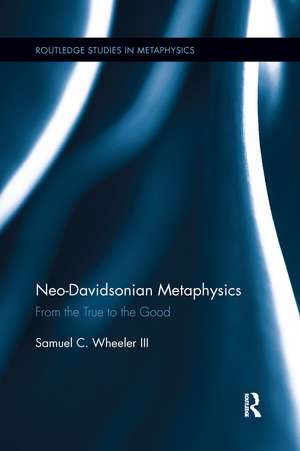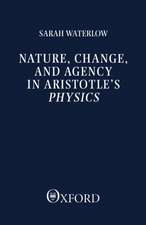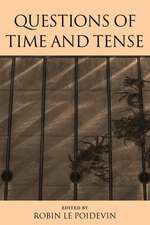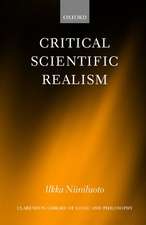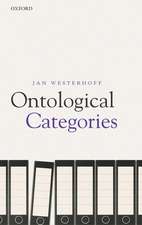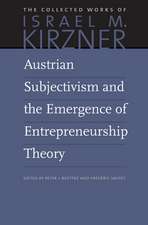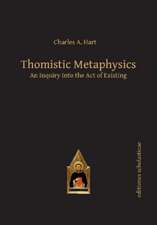Neo-Davidsonian Metaphysics: From the True to the Good: Routledge Studies in Metaphysics
Autor Samuel C Wheeleren Limba Engleză Paperback – 3 mar 2016
| Toate formatele și edițiile | Preț | Express |
|---|---|---|
| Paperback (1) | 389.38 lei 6-8 săpt. | |
| Taylor & Francis – 3 mar 2016 | 389.38 lei 6-8 săpt. | |
| Hardback (1) | 1060.52 lei 6-8 săpt. | |
| Taylor & Francis – 16 aug 2013 | 1060.52 lei 6-8 săpt. |
Din seria Routledge Studies in Metaphysics
-
 Preț: 309.65 lei
Preț: 309.65 lei -
 Preț: 384.59 lei
Preț: 384.59 lei -
 Preț: 310.36 lei
Preț: 310.36 lei - 18%
 Preț: 1000.27 lei
Preț: 1000.27 lei -
 Preț: 313.15 lei
Preț: 313.15 lei -
 Preț: 416.22 lei
Preț: 416.22 lei -
 Preț: 484.47 lei
Preț: 484.47 lei - 18%
 Preț: 999.34 lei
Preț: 999.34 lei -
 Preț: 388.64 lei
Preț: 388.64 lei - 18%
 Preț: 1005.80 lei
Preț: 1005.80 lei -
 Preț: 390.25 lei
Preț: 390.25 lei - 18%
 Preț: 1001.70 lei
Preț: 1001.70 lei -
 Preț: 389.38 lei
Preț: 389.38 lei - 18%
 Preț: 1005.67 lei
Preț: 1005.67 lei - 18%
 Preț: 1000.27 lei
Preț: 1000.27 lei - 18%
 Preț: 945.98 lei
Preț: 945.98 lei -
 Preț: 392.21 lei
Preț: 392.21 lei -
 Preț: 483.55 lei
Preț: 483.55 lei -
 Preț: 385.47 lei
Preț: 385.47 lei - 18%
 Preț: 1000.13 lei
Preț: 1000.13 lei -
 Preț: 381.43 lei
Preț: 381.43 lei -
 Preț: 311.48 lei
Preț: 311.48 lei -
 Preț: 483.49 lei
Preț: 483.49 lei -
 Preț: 488.29 lei
Preț: 488.29 lei - 18%
 Preț: 999.97 lei
Preț: 999.97 lei -
 Preț: 386.39 lei
Preț: 386.39 lei - 18%
 Preț: 996.20 lei
Preț: 996.20 lei -
 Preț: 387.58 lei
Preț: 387.58 lei -
 Preț: 390.37 lei
Preț: 390.37 lei - 18%
 Preț: 1004.06 lei
Preț: 1004.06 lei - 18%
 Preț: 949.60 lei
Preț: 949.60 lei - 21%
 Preț: 257.68 lei
Preț: 257.68 lei
Preț: 389.38 lei
Nou
Puncte Express: 584
Preț estimativ în valută:
74.51€ • 79.67$ • 62.12£
74.51€ • 79.67$ • 62.12£
Carte tipărită la comandă
Livrare economică 18 aprilie-02 mai
Preluare comenzi: 021 569.72.76
Specificații
ISBN-13: 9781138657373
ISBN-10: 1138657379
Pagini: 248
Dimensiuni: 152 x 229 x 17 mm
Greutate: 0.45 kg
Ediția:1
Editura: Taylor & Francis
Colecția Routledge
Seria Routledge Studies in Metaphysics
Locul publicării:Oxford, United Kingdom
ISBN-10: 1138657379
Pagini: 248
Dimensiuni: 152 x 229 x 17 mm
Greutate: 0.45 kg
Ediția:1
Editura: Taylor & Francis
Colecția Routledge
Seria Routledge Studies in Metaphysics
Locul publicării:Oxford, United Kingdom
Public țintă
Postgraduate and UndergraduateCuprins
Introduction 1. Davidsonian Truth and its Consequences 2. Against Absolute Essentialism 3. Natures, Necessity, and Relative Essentialism 4. Kinds of Events 5. Modals and Conditionals 6. Properties, Propositions, and Facts 7. Future Contingents and Temporary Intrinsics 8. The Sorites and Davidsonian Innocuous Epistemicism 9. The Good 10. What We Ought to Do
Recenzii
"Neo-Davidsonian Metaphysics is the most important and sustained elaboration of Davidsonian thinking that has appeared outside Davidson's own work. It takes up Davidson's ideas in a way that is original and innovative, and yet also true to the spirit of Davidson. In the course of providing new insights into Davidsonian thinking, Wheeler also shows how many contemporary philosophical problems can be dealt with by a careful working through and some judicious modification of key Davidsonian concepts and approaches. In particular, Wheeler's elaboration of the position he calls 'relative essentialism' is a groundbreaking development that deserves wide consideration by anyone interested in contemporary analytic thought." – Jeff Malpas, Distinguished Professor, University of Tasmania, Australia
"Wheeler's book is invaluable in articulating and clearing up all sorts of confusions about Davidson's metaphysical views. It brings the view closer to the thinking of contemporary metaphysicians and semanticists by eliminating some of its inessential or refuted assumptions." - Zoltán Gendler Szabó, Yale University
"Wheeler takes some of the core ideas of Davidson’s philosophy, and more than Davidson himself ever did, forges those into a single, clear and coherent theory." - Lajos Brons, Nihon University, Tokyo
"Wheeler's book is invaluable in articulating and clearing up all sorts of confusions about Davidson's metaphysical views. It brings the view closer to the thinking of contemporary metaphysicians and semanticists by eliminating some of its inessential or refuted assumptions." - Zoltán Gendler Szabó, Yale University
"Wheeler takes some of the core ideas of Davidson’s philosophy, and more than Davidson himself ever did, forges those into a single, clear and coherent theory." - Lajos Brons, Nihon University, Tokyo
Notă biografică
Samuel C. Wheeler III is Professor of Philosophy at the University of Connecticut, USA.
Descriere
In this book, Wheeler argues that given a Davidsonian understanding of truth, predication, and interpretation, and given a relativised version of Aristotelian essentialism compatible with Davidson’s basic thinking, many metaphysical problems are not very deep. Although the analyses and arguments he gives are often at odds with those at which Davidson arrived, they apply the central Davidsonian insights about semantics, understanding, and interpretation.
